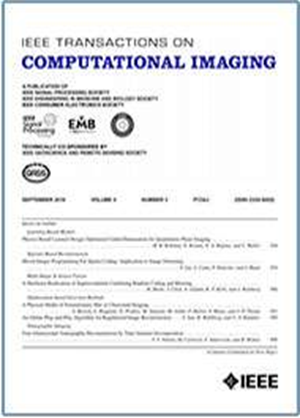Cascaded Frequency-Encoded Multi-Scale Neural Fields for Sparse-View CT Reconstruction
IF 4.8
2区 计算机科学
Q2 ENGINEERING, ELECTRICAL & ELECTRONIC
引用次数: 0
Abstract
Sparse-view computed tomography aims to reduce radiation exposure but often suffers from degraded image quality due to insufficient projection data. Traditional methods struggle to balance data fidelity and detail preservation, particularly in high-frequency regions. In this paper, we propose a Cascaded Frequency-Encoded Multi-Scale Neural Fields (Ca-FMNF) framework. We reformulate the reconstruction task as refining high-frequency residuals upon a high-quality low-frequency foundation. It integrates a pre-trained iterative unfolding network for initial low-frequency estimation with a FMNF to represent high-frequency residuals. The FMNF parameters are optimized by minimizing the discrepancy between the measured projections and those estimated through the imaging forward model, thereby refining the residuals based on the initial estimation. This dual-stage strategy enhances data consistency and preserves fine structures. The extensive experiments on simulated and clinical datasets demonstrate that our method achieves the optimal results in both quantitative metrics and visual quality, effectively reducing artifacts and preserving structural details.用于稀疏视图CT重建的级联频率编码多尺度神经场
稀疏视图计算机断层扫描旨在减少辐射暴露,但由于投影数据不足,通常会导致图像质量下降。传统的方法难以平衡数据保真度和细节保存,特别是在高频区域。本文提出了一种级联频率编码多尺度神经场(Ca-FMNF)框架。我们将重建任务重新定义为在高质量的低频基础上精炼高频残差。它集成了用于初始低频估计的预训练迭代展开网络和用于表示高频残差的FMNF。FMNF参数的优化是通过最小化实测投影与成像正演模型估计的投影之间的差异,从而在初始估计的基础上细化残差。这种双阶段策略增强了数据一致性并保留了精细的结构。在模拟和临床数据集上的大量实验表明,我们的方法在定量指标和视觉质量方面都取得了最佳结果,有效地减少了伪影并保留了结构细节。
本文章由计算机程序翻译,如有差异,请以英文原文为准。
求助全文
约1分钟内获得全文
求助全文
来源期刊

IEEE Transactions on Computational Imaging
Mathematics-Computational Mathematics
CiteScore
8.20
自引率
7.40%
发文量
59
期刊介绍:
The IEEE Transactions on Computational Imaging will publish articles where computation plays an integral role in the image formation process. Papers will cover all areas of computational imaging ranging from fundamental theoretical methods to the latest innovative computational imaging system designs. Topics of interest will include advanced algorithms and mathematical techniques, model-based data inversion, methods for image and signal recovery from sparse and incomplete data, techniques for non-traditional sensing of image data, methods for dynamic information acquisition and extraction from imaging sensors, software and hardware for efficient computation in imaging systems, and highly novel imaging system design.
 求助内容:
求助内容: 应助结果提醒方式:
应助结果提醒方式:


